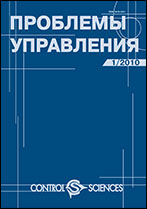|
This article is cited in 1 scientific paper (total in 1 paper)
Control in the socio-economic systems
Evaluation of efficiency of eco-innovation management based on DEA models with lags and negative outputs
S. V. Ratner
V.A. Trapeznikov Institute of Control Sciences of Russian Academy of Sciences, Moscow, Russia
Abstract:
The article develops a new approach to assessing the effectiveness of environmental management systems in Russian regions based on the use of DEA models. The current and capital expenditures on environmental protection measures are considered as inputs of the model, and the changes in the load of the regional economy on the environment in a wide range of environmental indicators are considered as outputs. A distinctive feature of the proposed approach is the accounting for delayed effects of capital expenditures on environmental protection measures. The possibility of applying the scale shift procedure to eliminate the problem of the presence of negative outputs is shown. Based on a combination of econometric modeling methods and DEA methodology, dynamic models were constructed and the level of eco-innovation development in Russian regions was assessed. It has been revealed that the proposed combination of models and approaches allows better taking into account the economic logic of regional environmental management processes in comparison to the traditional method of selecting inputs and outputs of the environmental DEA model and, as a result, setting the incentives system of the state environmental policy more precisely.
Keywords:
analysis of the functioning environment, negative inputs, delayed effects, optimization, eco-innovations, regional environmental management system.
Received: 17.07.2019
Revised: 03.02.2020
Accepted: 05.03.2020
Citation:
S. V. Ratner, “Evaluation of efficiency of eco-innovation management based on DEA models with lags and negative outputs”, Probl. Upr., 2020, no. 5, 39–49
Linking options:
https://www.mathnet.ru/eng/pu1208 https://www.mathnet.ru/eng/pu/v5/p39
|

| Statistics & downloads: |
| Abstract page: | 90 | | Full-text PDF : | 24 | | References: | 21 | | First page: | 6 |
|




 Contact us:
Contact us: Terms of Use
Terms of Use
 Registration to the website
Registration to the website Logotypes
Logotypes









 Citation in format
Citation in format 